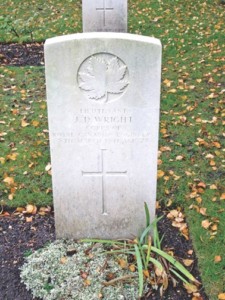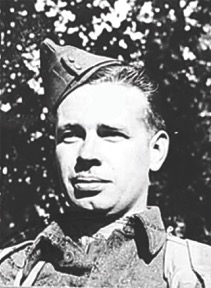Tom St. Amand and Tom Slater, special to The Sarnia Journal
(2016) In wartime the decisions a person makes can mean life or death.
Lieutenant John “Jack” David Wright died a hero in London, England during the Germain Blitz. But what cost the 28-year-old Sarnian his life was his taste in music.
Wright was born in Petrolia, the son of David and Florence, and by 1924 he and his family were living in Sarnia. After graduating from SCITS, he began a five-year education co-operative program at Imperial Oil.
He was always interested in the military, beginning at high school where he was a rifle club member. He also served in the Non-Permanent Active Militia (NPAM) with the First Field Company, Royal Canadian Engineers in Sarnia. When war erupted in 1939, Wright surprised no one by leaving his job at the refinery to enlist for overseas duty.
In July of 1940, after spending his last furlough at home, Lieutenant Wright of the Royal Canadian Engineers arrived in the United Kingdo m.
m.
Much was expected of him. A military evaluation recognized him as “industrious and very keen and sound in handling men . . . a born leader very popular with his men.”
Wright was still serving in England in 1941 when, on the night of March 8, he visited the Cafe de Paris nightclub with a group of Canadian friends, including Nursing Sisters Thelma Stewart and Helen Stevens, and fellow Sarnian, Lieutenant Jack Clunie.
Built in 1924, the Cafe de Paris was a famous landmark. It featured performers like Marlene Dietrich and Cole Porter and was where the Charleston was introduced to Londoners.
Everyone knew it was risky to be there. The relentless German bombing of Britain, known as the Blitz, had begun after Hitler’s invasion plans failed. Night after night, German planes dropped tons of high explosives and lethal gas bombs on London, Coventry and Plymouth. London was bombed 57 consecutive nights until the Blitz ended in May of 1941.
Inside the Cafe de Paris that night, around 10 p.m., the orchestra started playing “Oh Johnny.” Jack Clunie and Helen Stevens sat down at a balcony table because they didn’t like the song.
That decision saved their lives.
Lt. Wright, however, was still dancing with Torontonian Thelma Stewart when a high-explosive bomb crashed through the roof and detonated in front of the stage. Wright’s immediate reaction was instinctive and heroic—he threw his body across his dance partner to take the brunt of the blast. According to Helen Stevens, Jack “shielded Miss Stewart as soon as he heard the bomb screaming. He died protecting [Thelma].”
At least 85 people perished in the bombing and Thelma Stewart would surely have joined them if not for Jack Wright. She was shaken but suffered only a hand injury.
In the aftermath, Jack Clunie and Helen Stevens were recognized for their effort in tending to the injured.
Wright’s relatives in Sarnia received a letter informing them of his death. Virtually all the officers and men from Sarnia who were in the area attended the military funeral. He was buried in Brookwood Military Cemetery, England.
Before Jack Wright headed overseas his superiors had noted the high standard of his character. At no time was that more evident than in the final seconds of the young Lieutenant’s life.


